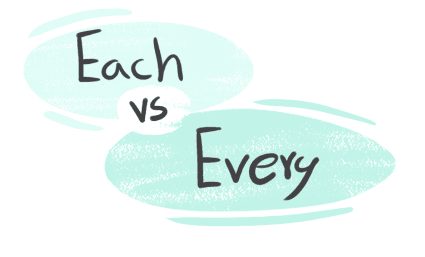Understanding Each and Every: How to Choose the Right Word
Contents

Do you remember the last time you were writing an important email to a client and paused, wondering whether to use 'each' or 'every'? Maybe you were describing the features of a product by your company or discussing targets for every quarter. The problem is real.
When it comes to understanding the usage of 'each' and 'every', it's easy to get confused. These words seem deceptively similar, but they can change the meaning of a sentence when used interchangeably.
But don't worry! Like in all Clapingo blog posts, we are here to clear up your confusion with a comprehensive guide on when and how to use 'each' and 'every'.
Understanding "Each"
Let's understand the term 'each' in our each vs every meaning exploration. The word 'each' is used to refer to individual members of a group or collection and is usually used when you want to focus on one at a time.
It's simple to use; just remember that it always precedes a singular noun.
For instance, you might say, "Each student in the class received an award." Here, you're focusing on the students individually - each student has their own separate award.
Common errors involve forgetting that 'each' is always followed by a singular noun and verb. Avoid sentences like "Each people were happy." It should be "Each person was happy."
So remember, when you want to emphasise individuality within a group, go for 'each'.
Dissecting "Every"
Essentially, 'Every' refers to all members of a group or category but treats them as a collective whole, not as individuals.
For instance, when you say "every student in the class", you're referring to all students collectively. You're not focusing on individual students but addressing them as one entity.
Now let's look at some practical examples:
"She attends school every day." - Here, 'every' is used to denote repetition or regularity.
"Every book on this shelf is interesting." - In this case, 'every' is used to refer to all the books as a collective whole.
We often see some common mistakes while using ‘Every’. Here are a few:
Using 'every' with plural nouns:
Incorrect - "Every dogs are barking."
Correct - "Every dog is barking."
Using 'every' with uncountable nouns:
Incorrect - “Every information was useful.”
Correct – “All information was useful.”
Each vs Every: The Key Differences
When it comes to each vs every usage, it's important to understand the small differences that separate these two words. Although both are used to talk about individual members of a group, 'each' implies attention to individual items separately, while 'every' refers to all the items as a group.
Each | Every | |
Focus | Individual items separately | All items as a group |
Example | Each student has received a book. | Every student has received a book. |
Each Vs Every in Indian English Contexts

Cultural events like festivals provide ideal scenarios for understanding this difference.
Let's take Diwali, a festival celebrated over five days.
Saying "I light diyas each day during Diwali" signifies you light diyas on all individual days, emphasizing each separate day.
Conversely, "I light diyas every day during Diwali" implies the continuity of this action throughout the festival without focusing on individual days.
Confusion often arises with phrases like each vs every year, so let's use Pongal as an example.
While we say "Each year, I visit my hometown during Pongal," emphasizing every single year as separate entities.
We say "Every year we celebrate Pongal with great fervour," implying an unbroken tradition over the years.
Practical Exercises to Perfect Your Usage
In your journey towards improving your spoken English, practising each vs every usage is key. Here are some exercises that can help:
1. Fill in the blanks: Use 'each' or 'every' in the following sentences:
_______ employee must submit their report by Friday.
I water my plants _______ day.
She visits her grandmother _______ weekend.
Solution:
Each employee must submit their report by Friday.
I water my plants every day.
She visits her grandmother each weekend.
2. Spot the error: Identify if the sentences use 'each' and 'every' correctly:
I meet him at the café each days.
Every of her paintings is beautiful.
Solution:
Incorrect. Correct sentence: I meet him at the café every day.
Incorrect. Correct sentence: Each of her paintings is beautiful.
Remember these tips while practising:
While 'every' can only be followed by singular nouns, 'each' can follow both singular and plural nouns.
Avoid using ‘each’ or ‘every’ interchangeably; they denote different meanings.
Watch & Learn- Aiding Understanding with Videos
To further help your understanding of the concept each vs every, we've found a selection of YouTube videos that go into their practical usage in spoken English. These videos take a simple, easy-to-grasp approach, perfect for non-native English speakers in India.
Each vs Every - English In A Minute, BBC Learning English
Each vs Every - Usage and differences - English Grammar lesson
Quick Recap
Remember the key takeaway - 'each' is used when referring to individual items in a group and 'every' is used for groups as a whole. For instance, 'Each day is a new opportunity' means every single day individually is a new opportunity, while 'Every year we celebrate Diwali with family' refers to the group of all years as a whole.
If you're still unsure about when to use each vs every, keep practising with the exercises and worksheets we have provided and other online resources.
It's not uncommon for non-native speakers to face challenges with such differences. And Clapingo, your supportive companion on this journey, offers personalised coaching sessions focusing on fluency, pronunciation, vocabulary and sentence structure - assisting you in mastering these subtleties.
In the pursuit of English proficiency, one thing holds true - perseverance pays off. Book your instant demo with Clapingo today!
Frequently Asked Questions
1. What's the difference between 'each' and 'every'?
While both words refer to individuals within a group, 'each' is used when referring to individual members of a group separately, while 'every' is used to refer to all members of a group collectively.
2. Can I use 'each' and 'every' interchangeably?
Not always. It depends on the context. For instance, in "Each day brings new opportunities," you can replace 'each' with 'every'. But in "Each of my friends has a different taste in music", replacing 'each' with 'every' changes the meaning.
3. When to use each vs every day?
Both can be used to express regularity but ‘each day’ emphasises individual days, whereas ‘every day’ implies all days as a whole.
You may want to read.
Mastering the Usage of 'To' vs 'For' - A Comprehensive Guide
Comments
Your comment has been submitted